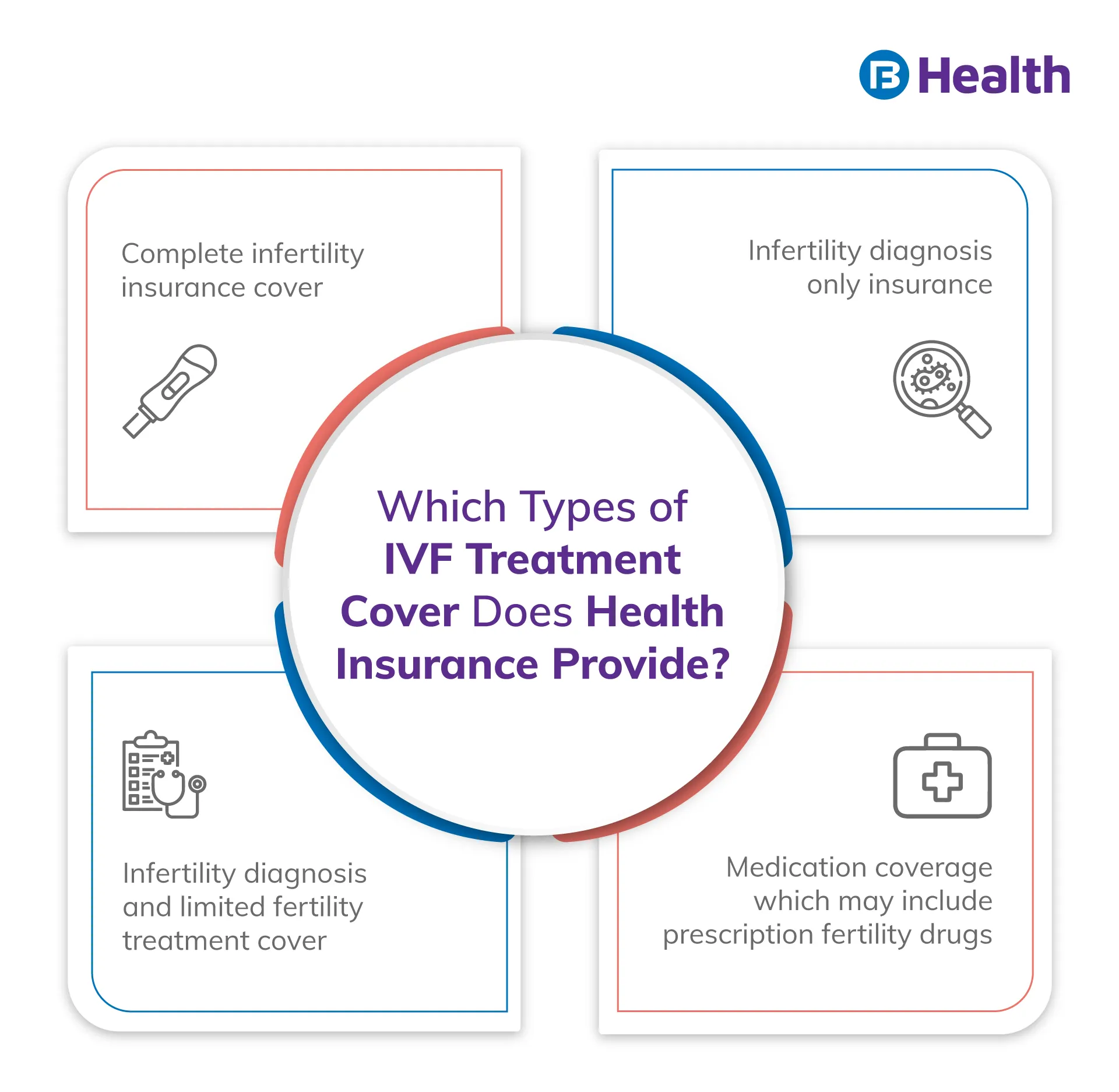Aarogya Care | 7 min read
IVF Treatment: Is IVF Covered by Health Insurance?
Medically reviewed by
Table of Content
Synopsis
There is no greater joy than parenthood, but infertility may sometimes stand in the way of a couple's dream of welcoming a baby. Infertility treatments, such as IVF, are not easy on the pocket. These high costs hinder the couple's chance of completing their family. Health insurance is a great way to take care of medical expenses. But is IVF covered by insurance? Keep reading to find out.
Key Takeaways
- It's crucial to search health insurance that covers fertility treatment and get right coverage and financial assistance
- Infertility treatments are expensive, but with the right health insurance, your treatments can be covered without worry
- Not all health insurance plans cover IVF treatment; you must check the inclusions and exclusions before buying one
When do People Resort to IVF?
Infertility is the inability to conceive after one year or longer of unprotected sex. This medical condition can affect both men and women. Infertility is classified into two types – primary and secondary. Primary infertility is when couples cannot become pregnant after at least one year of having sex without using birth control methods. In comparison, secondary infertility refers to couples who have previously been able to conceive but are now unable to do so. Around 28 million couples suffer from infertility, yet less than 1% seek medical treatment mainly because of its high costs. [1] This is why it is essential to find IVF treatments covered by insurance.
Getting pregnant depends on successful ovulation, fertilization, and implantation process. Hindrance in any of these steps can prevent you from getting pregnant.
Is Infertility Treatment Covered Under Health Insurance?
Most health insurance policies do not cover the cost of infertility treatment. However, new-age insurers are designing plans that include or offer infertility treatment coverage as an add-on cover. Some policies combine infertility treatment coverage with maternity insurance. Most plans also cover the treatment cost for both primary and secondary infertility conditions.
Some policies may only cover specific infertility treatments. Therefore, it is important to ask if IVF is covered by insurance to your insurance provider beforehand. Before purchasing one, it is also best to review the inclusions and exclusions and the level of coverage for infertility.
Some health insurance plan that cover infertility treatment may have a more extended waiting period, expense caps, or sub-limits. Compare different health plans that cover infertility treatment to ensure you get the right coverage and financial assistance.
Additional Read: Maternity Benefit Health Insurance
Diagnosis of Infertility
Infertility diagnoses include the following:
- Hormonal profile testing
- Genetic analysis
- Semen analysis
- DNA testing for abnormalities
- Imaging tests for both men and women
- Ovarian reserve testing
- Laparoscopy
- Hysteroscopy
- Hysterosalpingography
Infertility Treatments Covered by Health Insurance
Infertility concerns in couples might exist from the start, or they can manifest later in life. There are several potential causes of infertility. Some of the most prevalent reasons for infertility are listed below.
- Genetics
- Stress
- Diabetes
- Sedentary lifestyle
- Obesity
- Tobacco use/smoking
- Infections
- Unhealthy dietary habits
- Drinking too much alcohol
- Male or female reproductive conditions
- Pollution
- Abortion
- Irregular sleeping habits
- Advancing age in women
- Regular use of emergency devices

Types of Infertility Treatment Procedures Covered by Health Insurance
Insurance policies with a complete health solution or with an add-on cover may include multiple infertility treatments, such as:
- In Vitro Fertilisation (IVF) - This procedure includes collecting eggs from the ovaries and mixing them with sperm to create an embryo. After which, the embryo is implanted in the uterus. IVF, covered by health insurance, takes care of all the medical bills needed to fund this procedure
- Intrauterine Insemination (IUI) – This process is performed in a laboratory setting and involves inserting sperm into the uterus during ovulation
- Gamete Intrafallopian Transfer (GIFT) - In this procedure, the eggs and sperm are mixed in a laboratory dish before being implanted in the fallopian tubes
- Intracytoplasmic Sperm Injection (ICSI)- A single sperm is injected into a single egg in a laboratory dish, and the embryo is put in the uterus in this process
You must understand what precisely your health insurance policy covers. You can better understand the plans by speaking with your insurance provider or visiting their website.
List of IVF Treatments Covered Under Health Insurance
Before we get into the health insurance plans that cover IVF, we must understand the four types of IVF coverage that a health insurance policy might give.
Health insurance plans for IVF are broken down below:
- Complete infertility insurance cover
- Infertility diagnosis-only insurance
- Infertility diagnosis and limited fertility treatment cover
- Medication coverage which may include prescription fertility drugs
Each of these plans offers IVF treatment covered by insurance to varying degrees. Unfortunately, fertility drugs can be a little confusing. While your insurance may cover one type of medication, it may not cover another. So, while prescription drugs are still a concern, you should discuss them with your general physician ahead of time.
Some families are fortunate to have a successful first attempt at in vitro fertilisation (IVF). Understanding the insurance benefits you are eligible for will help you decide what treatment to pursue. Check your policy to see how many attempts are covered. In IVF, for example, an insurance policy can specify the number of embryo transfer attempts. If the first cycle was unsuccessful, an additional cycle might be covered.
Always check the terms and conditions of the insurance policy to understand the coverage details.
Additional read: Parents Health Insurance Tax BenefitPoints to Keep in Mind While Buying Health Insurance for Infertility Treatment
All health insurance plans don't cover infertility treatment. It is recommended that you review the plan's terms and conditions. Here are some important factors to consider before buying health insurance for infertility treatment.
- Check to see if your insurance covers the cost of a fertility diagnosis: Sum insured or coverage offered by insurance plans for IVF procedures
- Check the eligibility criteria to see who is covered by the plan: This depends on your age, gender, medical history, lifestyle, and occupation
- Examine the treatment procedures covered by the plan: is IVF covered by your insurance plan?
- Examine the coverage's sub-limits and scope: The sum insured might be limited or restricted, and you may be required to contribute to a portion of the claimable amount
- Check the waiting period: The waiting period for infertility treatment can vary from insurer to insurer
- Check to see the validity: The number of times you can avail of fertility expenses or the number of claims you can raise under your insurance policy
- Check to see if the plan covers prescribed medications: Your insurance may only cover one type of medication and not another
- Check to see if any add-on covers other types of infertility treatment procedures: Ask if Intrauterine Insemination (IUI), Gamete Intrafallopian Transfer (GIFT), Intracytoplasmic Sperm Injection (ICSI), or other procedures included in your insurance cover
- Check to see if they offer a health card: With a health card, you can look at the exact coverage features and policy information
Benefits of Buying Health Insurance for Infertility Treatment
An insurer's safety net covering infertility treatments is invaluable for couples trying to conceive. Here are some reasons to buy health insurance that covers infertility treatment:
- Coverage against medical expenses: Infertility treatments such as IVF are expensive. Proper health insurance can let you focus on the bright side of having a baby rather than worrying about paying such high costs
- Tax benefits: Health insurance plans offer tax benefits and financial protection. These tax advantages are available as a deduction
- Cashless claims: With this option, the insurer will settle the claim amount directly with the hospital, and you will not be responsible for any hospitalisation costs. To take advantage of the cashless facility, you must seek treatment at one of the insurer's networks hospitals
Infertility is a major public health concern in India and affects around 10 to 14% of India's population. [2] Health insurance policies that include coverage for infertility treatment, either as an optional extra or as part of the basic plan, can be a huge financial help for couples struggling to conceive but otherwise would not be able to afford fertility care.
Therefore, it is essential to search for fertility treatment covered by insurance beforehand. To answer the question – is IVF covered by insurance? It depends on the particular insurance provider and insurance plan.
Don't let the high costs of fertility treatment stand in between your dream of becoming a parent. Visit Bajaj Finserv Health to find a comprehensive health insurance plan catered to your needs.
References
- https://timesofindia.indiatimes.com/blogs/voices/addressing-the-hidden-burden-of-infertility-in-india/
- https://www.ncbi.nlm.nih.gov/pmc/articles/PMC4188020/
Disclaimer
Please note that this article is solely meant for informational purposes and Bajaj Finserv Health Limited (“BFHL”) does not shoulder any responsibility of the views/advice/information expressed/given by the writer/reviewer/originator. This article should not be considered as a substitute for any medical advice, diagnosis or treatment. Always consult with your trusted physician/qualified healthcare professional to evaluate your medical condition. The above article has been reviewed by a qualified doctor and BFHL is not responsible for any damages for any information or services provided by any third party.





